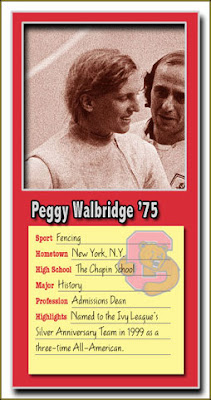
"We live in a different world in the Caribbean," asserts Dawn Chuck. "I hadn't heard of Brown, didn't know it was in the Ivy League."
Brown, however, had heard of Dawn Chuck.
A competitive swimmer in Jamaica since the age of six, Chuck was attending a stroke clinic given by a visiting American coach, arranged by her longtime coach, Jacqueline Walter. Her coach had an ulterior motive in arranging the stroke clinic. "She wanted me to go to college in the U.S." says Chuck. "She thought the facilities were better."
The American coach mentioned he could pass Chuck's name on to college coaches, and soon Brown coach Matt Kredich invited her on a recruiting trip. "I loved everything about the school and team," says Chuck, "I knew that I wanted to swim throughout my college career but also be able to focus on my academics, so Matt and the swimming program at Brown definitely had a great impact on my decision." She decided on Brown, turning aside offers from Villanova University and the University of Maryland, Baltimore County.
For the complete story, please click here.





